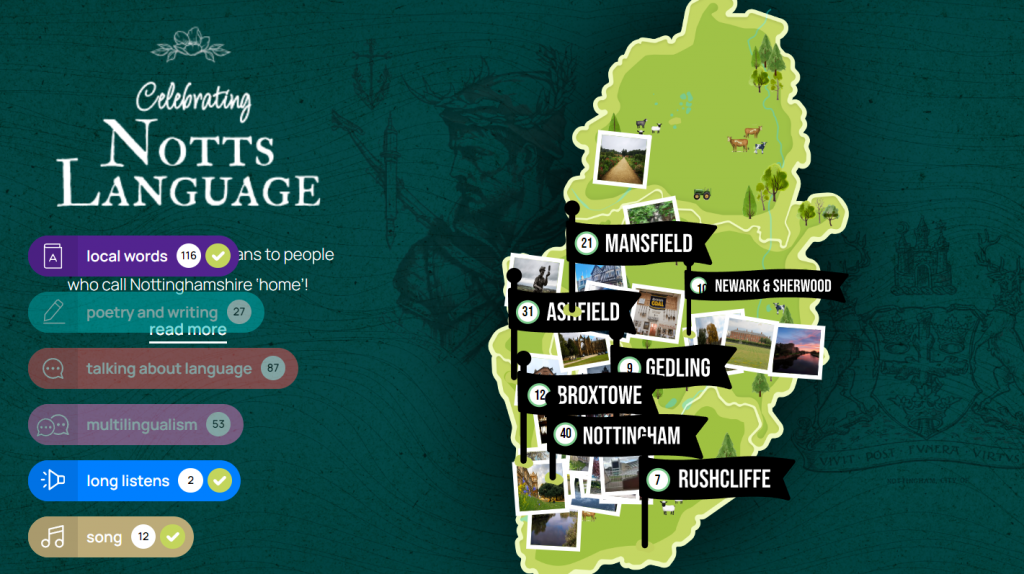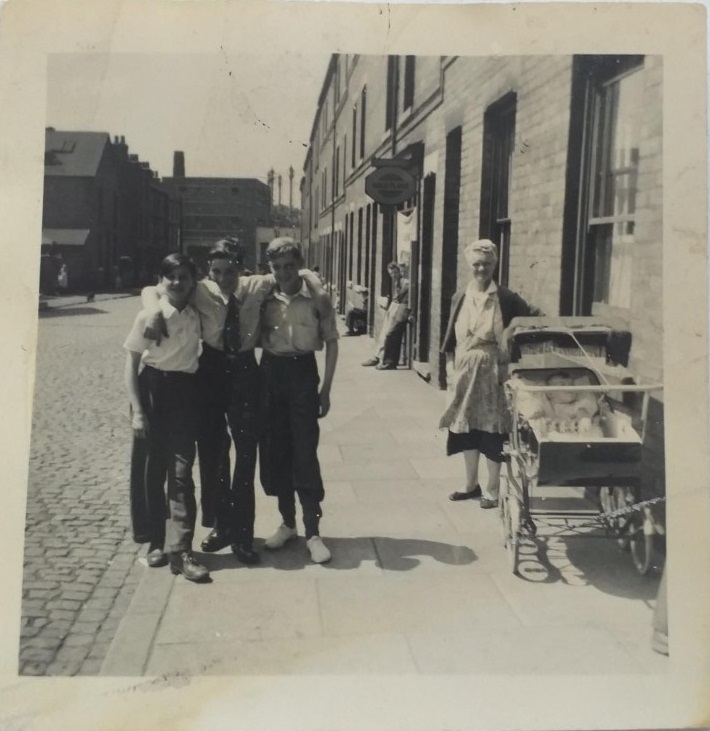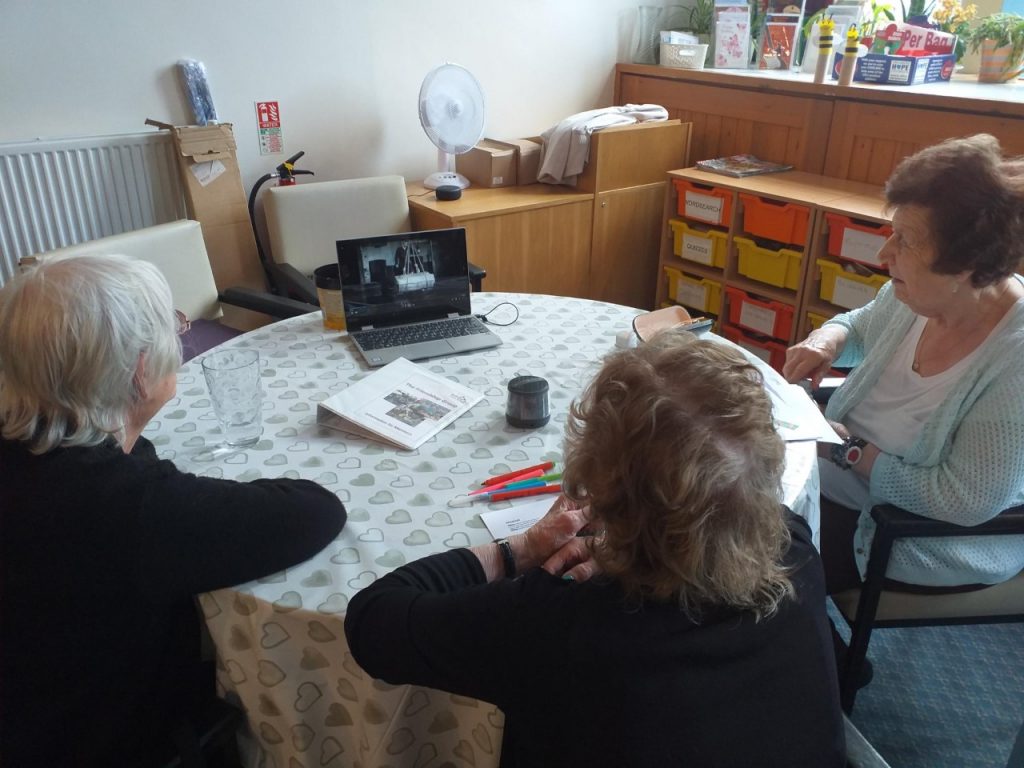 When I first returned to Nottingham, I kept popping into the cob shop at the Theatre Royal tram stop because the staff there had such thick Nottingham accents. One of them had a form of Notts turrets, interjecting duck at every opportunity: ‘Egg mayo, duck, with lettuce, duck, on white or brown, duck…’ It was music to my ears, a lovely warm feeling, like sinking slowly into a bubble bath and turning the hot tap with my toes. God, how much I’d missed those flat vowels.
When I first returned to Nottingham, I kept popping into the cob shop at the Theatre Royal tram stop because the staff there had such thick Nottingham accents. One of them had a form of Notts turrets, interjecting duck at every opportunity: ‘Egg mayo, duck, with lettuce, duck, on white or brown, duck…’ It was music to my ears, a lovely warm feeling, like sinking slowly into a bubble bath and turning the hot tap with my toes. God, how much I’d missed those flat vowels.
Dialect is a form of intangible culture and an integral part of identity. It carries the knowledge, values, attitudes, and experiences of people. The Notts dialect is something I’ve celebrated and promoted in various forms during my 13 years as LeftLion Literature editor, through comics such as Dawn of the Unread and Whatever People Say I Am, through documentaries on the wireless, and more recently through the writing of that mardy bloke from Eastwood – dialect was the second artefact in the D.H. Lawrence Memory Theatre. Natalie Braber, a Professor in Linguistics at Nottingham Trent University, provided the contextual essays for this.
I mention this as Natalie has recently finished a project where she interviewed a broad range of people, including schoolchildren, ex-miners, locals – those who were born here, and those who have moved here – to try and map out the Notts accent. Each participant was asked ‘to share what language means to them: their favourite words and expressions – whether dialect, familect (words used within families), ethnolect (language associated with an ethnic group), work-related vocabulary or words from another language; and poems, stories and songs which invoke place’.
I submitted shin-tin’ as my favourite word (‘she isn’t in’) and read an extract from Alan Sillitoe’s Saturday Night and Sunday Morning (1958). I find the dialect in Lawrence’s work, such as the poem ‘The Collier’s Wife’, too complex to read. Only those who straddle the Derbyshire/Notts border, like mining historian David Amos, have the tongue for it. This is why ‘Celebrating Notts Language’ is important, because it captures the richness and variety of spoken dialect.
Although the East Midlands dialect of Middle English was an influence on the development of Standard English, there’s been little research into the spoken English of the area. Dialect tends be thought of in terms of north (bath) and south (baath) when perhaps there needs to be a tripartite distinction. Nottingham, as always, is hard to categorise, borrowing from the north (‘bus’) and south (‘aaas’/house) – exactly as you would expect from a city bang in the middle of the country.
There are many arguments suggesting language is becoming homogenous, mainly due to the globalisation of work and media, would it be too radical to suggest that a bigger threat to dialect is we are talking less to each other? The mining and industry communities that Lawrence and Sillitoe wrote about are gone – as is the pub where ‘everybody knows your name’. More people work remotely or interact with a screen rather than a human. Millennials no longer need to call each other when a status update or WhatsApp message serves the same function. Surely this must impact on language, accent, and dialect.
Natalie’s website: Celebrating Notts Language
This article is a variation on one published on the Digital Pilgrimage, 14 August 2023. Further Reading
- James Walker/Made in Manchester Productions. Tongue and Talk: The Dialect Poets of the Pits (2021) BBC Radio 4
- James Walker. Thar’t a Mard Arse. Memory Theatre.
- Natalie Braber. Mardy ducks: Nottingham Dialect Words. Memory Theatre.
- Natalie Braber. What is the Nottingham dialect and where does it come from? Memory Theatre.
- Natalie Braber. Lawrencian Dialect. Memory Theatre.
- Natalie Braber and Jonnie Robinson (2018) East Midlands English. Berlin: Mouton de Gruyter.
- Natalie Braber and Sandra Jansen (Eds.) (2018) Sociolinguistics in England. London: Palgrave Macmillan.
- Natalie Braber (2018) Pit Talk in the East Midlands. In: N. Braber and S. Jansen (eds.) Sociolinguistics in England. London: Palgrave Macmillan, 243-274.
- Natalie Braber (2018) Performing identity on screen: Language, identity, and humour in Scottish television comedy. In: R. Bassiouney (ed.) Dialect and identity performance. London: Routledge, 265-285.
- Natalie Braber, Suzy Harrison and Claire Ashmore (2017) Pit Talk in the East Midlands. Sheffield: Bradwell Books.
- Natalie Braber and David Amos (2017) Images of the Coalfields. Sheffield: Bradwell Books.
- Natalie Braber and Diane Davies (2016) Using and creating oral history in dialect research. Oral History 44(1), 98-107.



